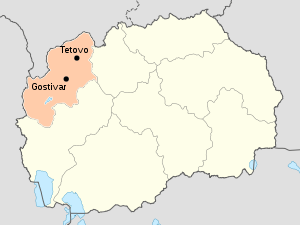Polog Statistical Region
The Polog Statistical Region (Macedonian: Полошки регион, Albanian: Rajoni Pollog) is one of eight statistical regions of the Republic of North Macedonia. Polog, located in the northwestern part of the country, borders Albania and Kosovo[a]. Internally, it borders the Southwestern and Skopje statistical regions.
Polog Statistical Region Полошки регион Rajoni Pollog | |
|---|---|
statistical region | |
 | |
| Area | |
| • Total | 2,479 km2 (957 sq mi) |
| Population (2018)[1] | |
| • Total | 322,338 |
| • Density | 130/km2 (340/sq mi) |
| HDI (2017) | 0.739[2] high · 6th of 8 |
Municipalities

The municipalities of the Polog statistical region
Polog is divided into 9 municipalities:
Demographics

Map of the majority ethnic groups in the region.
Population
The current population of the Polog statistical region is 304,125 citizens, according to the last population census in 2002.
| Census Year | Population | Change |
|---|---|---|
| 1994 | 282,432 | N/A |
| 2002 | 304,125 | +8.24% |
Ethnicities
Polog is the only statistical region in North Macedonia where Macedonians are not the majority.
| Number | % | |
| TOTAL | 304,125 | 100 |
| Albanians | 222,679 | 73.2 |
| Macedonians | 56,079 | 18.4 |
| Turks | 17,386 | 5.7 |
| Roma | 4,594 | 1.4 |
| others | 3,387 | 1.1 |
gollark: There's a Python thing too.
gollark: Great idea!
gollark: Maybe JabbaScript (idea from my misspelling of Java).
gollark: JavaScriptJava!
gollark: JavaJava and ScriptScript.
See also
Notes
| a. | ^ Kosovo is the subject of a territorial dispute between the Republic of Kosovo and the Republic of Serbia. The Republic of Kosovo unilaterally declared independence on 17 February 2008, but Serbia continues to claim it as part of its own sovereign territory. The two governments began to normalise relations in 2013, as part of the 2013 Brussels Agreement. Kosovo is currently recognized as an independent state by 97 out of the 193 United Nations member states. In total, 112 UN member states recognized Kosovo at some point, of which 15 later withdrew their recognition. |
| Wikimedia Commons has media related to Polog Statistical Region. |
References
- http://citypopulation.de/en/northmacedonia/cities/
- "Sub-national HDI - Area Database - Global Data Lab". hdi.globaldatalab.org. Retrieved 2018-09-13.
This article is issued from Wikipedia. The text is licensed under Creative Commons - Attribution - Sharealike. Additional terms may apply for the media files.